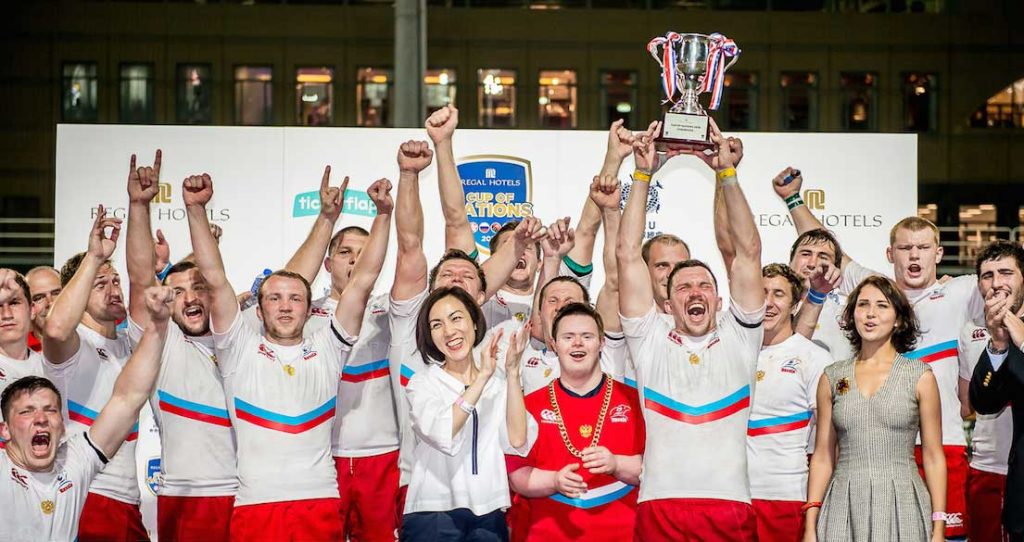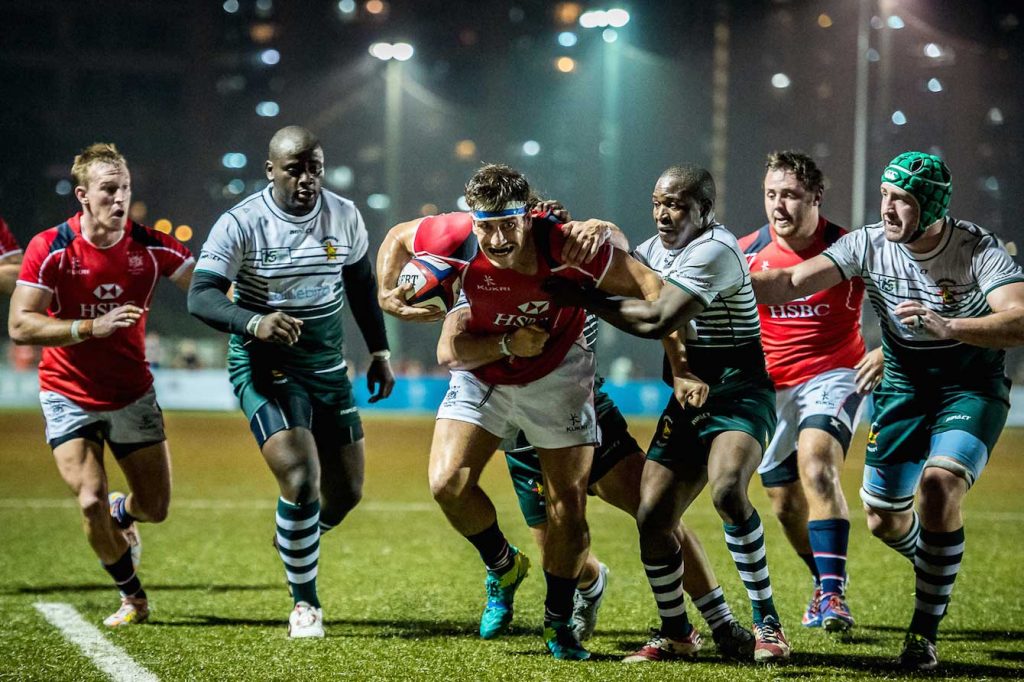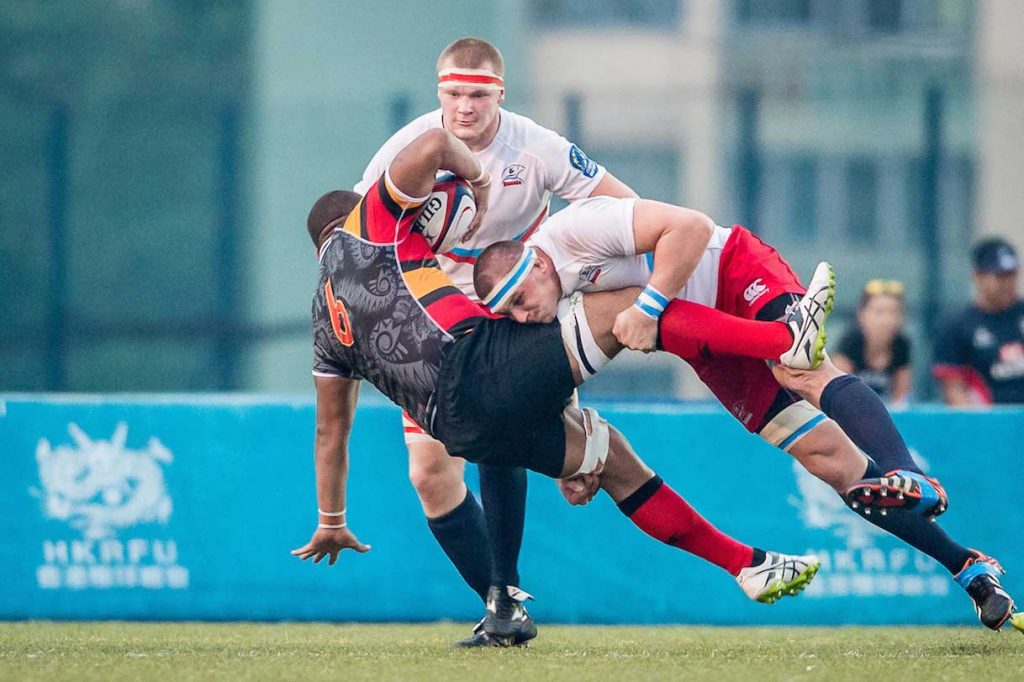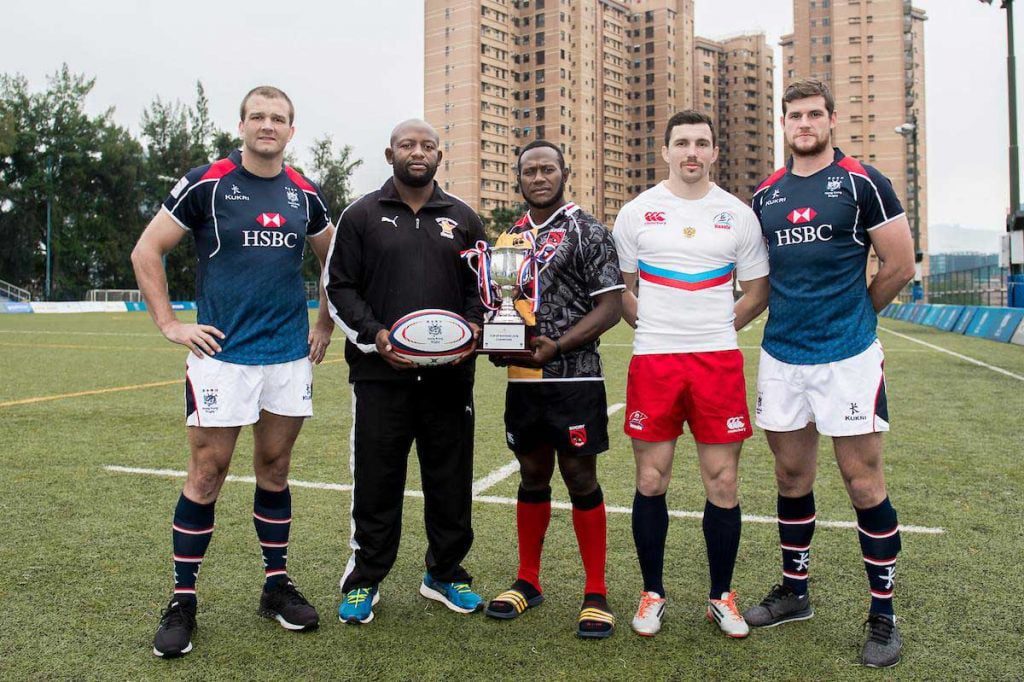Russia’s 27-0 victory over hosts Hong Kong secured their second straight Cup of Nations title after the defending champions won all three matches beating Zimbabwe (19-15) and Papua New Guinea (49-19) earlier in the week. The score line flattered the champions to a degree with the game evenly contested apart from the first and last ten minutes of the game.
Early nerves saw Hong Kong concede a 12-0 advantage in the opening quarter as Russia kept the ball in the forwards, capitalising on their size their opening drives were rewarded with two tries inside the opening ten minutes.
No.8 Pavel Butenko barrelled over the line from in close to score Russia’s first try in the seventh minute. Fly half Yurii Kushnarev was off with his conversion, but would get a second chance three minutes later after flanker Tagir Gadzhiev charged down a poor Hong Kong clearance kick on the try line before diving on the loose ball for his side’s second try in the tenth minute.
Kushnarev’s conversion extended the margin to 12-0 and Hong Kong were never able to close the gap. Kushnarev added a penalty late in the half as the game tightened up to give Russia a 15-0 margin at the break.
“I didn’t think Russia were 27 points better than us,” said Hong Kong coach Leigh Jones after the match, “but if you give them a 12 or 15 point start that is normally how it ends up. Ultimately, against quality teams like Russia if you make silly errors or bad decisions, you get punished, and that is what happened in the first 15 or 20 minutes.”
Left with much work to do after the opening quarter, Hong Kong settled into its patterns and started to show what it was capable of, but despite creating several scoring opportunities Hong Kong couldn’t capitalise as the hosts struggled in the accuracy stakes.
Hong Kong upped the pressure in the second half but the Russians boxed clever with Kushnarev and fullback Ramil Gaysin demonstrating some strong tactical kicking skills to keep Hong Kong moving backwards.
With Hong Kong trailing late in the game, Jones emptied his reserves bench and the hosts lost some of their shape, conceding two tries in the final ten minutes.
Winger Denis Simplikevich collected both tries against the run of play with his first coming in the 70th minute and his second on the stroke of full-time. Kushnarev slotted the second conversion to extend the visitors margin to 27-0 as the hooter sounded for full-time.
“While it is a 27-0 thumping at home, I’m not too despondent, because I am seeing signs that we are going in the right direction,” said Jones. “At times we had the Russians out on their feet, but we couldn’t ram that advantage home and turn that pressure into points.”
“We are developing a style of play that I think suits Hong Kong and we just need to keep working hard to be able to stick with that style for longer periods and under pressure,” Jones added.
A delighted Russia captain Vasily Artemyev gave full credit to Hong Kong saying: “The final was challenging as expected and I’m pleased at the result. Hong Kong is making progress. We got a few good scoring opportunities early on by keeping it tight, but in open play they are as strong as anyone we face.”
“They are hard to defend and hard to break down because they have a lot of speed and play very wide. But we stuck to our game plan and were more clinical than in our first two games,” added Artemyev.
The tournament will aid Russia’s build-up for the European championships early next year.
“Hong Kong play an interesting type of rugby and something we would expect from teams like Belgium, Spain and Germany in the European Cup so this competition is really helpful for us,” Artemyev added.
Tonight’s bonus point win sees Russia finish at the top of the table on 14 points, followed by Hong Kong (10), Zimbabwe (7) and Papua New Guinea (0).
Zimbabwe outran and outmuscled Papua New Guinea this afternoon, extending a 13-8 half-time lead to a final 38-11 victory.
The Papuans took an early lead after a penalty from fullback and captain Tisa Kautu, but Zimbabwe reclaimed the lead after No.8 Njabulo Ndhlovu’s try in the 7th minute. Winger James Lumaris pulled Papua New Guinea level in the 19th minute, but Zimbabwe built steam from then on, with a try from winger Tafadzwa Chotokwindo and a penalty from fullback Lenience Tambwera, giving them a 13-8 lead at the break.
The second half was one-way traffic as Zimbabwe found gaps in the Papua New Guinea interior defence to run in a further three tries while Tambwera added two more penalties. Winger Stephen Hunduza flashed some great individual skills to claim an 80-metre try in the 55th minute, breaking the Papuan resistance for good and bringing the score to 24-8 after two previous penalties from Tambwera.
Centre Riaan O’Neill and flanker Andrew Rose widened the floodgates with loping tries through the middle of the Papuan defence while conversions from Tambwera and fly half Tichifara Makwanya rounded out the scoring at 38-11.
Zimbabwe coach Cyprian Mandenge was pleased to cap off a fruitful week with a win, saying, “We are improving with every game. We got a result today, but there are a lot of areas we want to polish. We are losing too much possession and some of our decision-making was poor.
“But it’s good to finish with a win. We didn’t win last year, so I’m happy. There is some progress, but our big problem is that we lack game time. This is only our fourth game of 2016 and that’s not good enough. We want to play more games, which is why tournaments like this are so important,” Mandenge added.
“The teams in Africa are gaining ground on us. Kenya is playing a lot of games and they beat us this year in the African Cup. We aren’t the bullyboys anymore so we need more games so we can start challenging again. This is a higher standard than the Africa Cup, but we believe we can beat the teams here, especially if we can get more game time,” Mandenge added.
Papua New Guinea coach Sydney Wesley shared Mandenge’s assessment of the competition: “We can take a lot from this tournament. The standard of the other teams will go a long way towards developing our rugby. It is a lot tougher than our competition back home, the biennial FORU tournament.”
“This week has helped us identify some areas to work on. We need to improve our set piece and our scrums and lineouts. We will work hard on these areas leading up to the FORU Cup next year. Hopefully we will perform well there and get an invite back to this tournament. I am sure that with more game time we would come back a lot better and stronger,” Wesley added.
Additional reporting and image: HKRU




